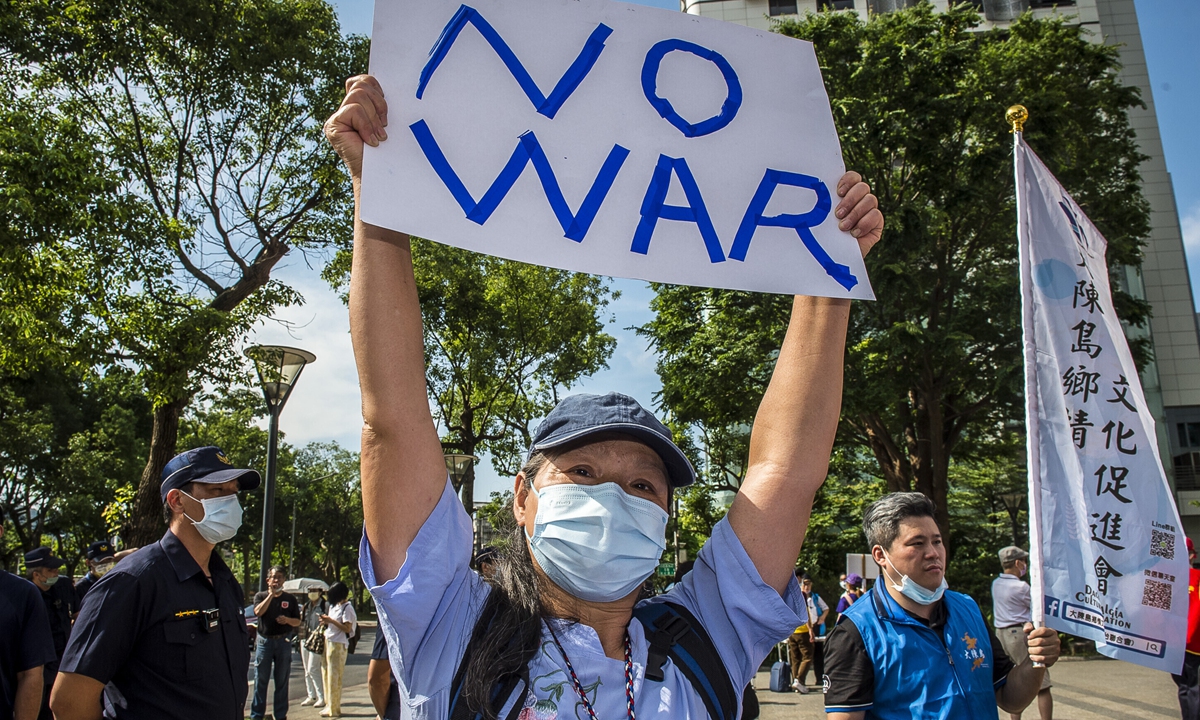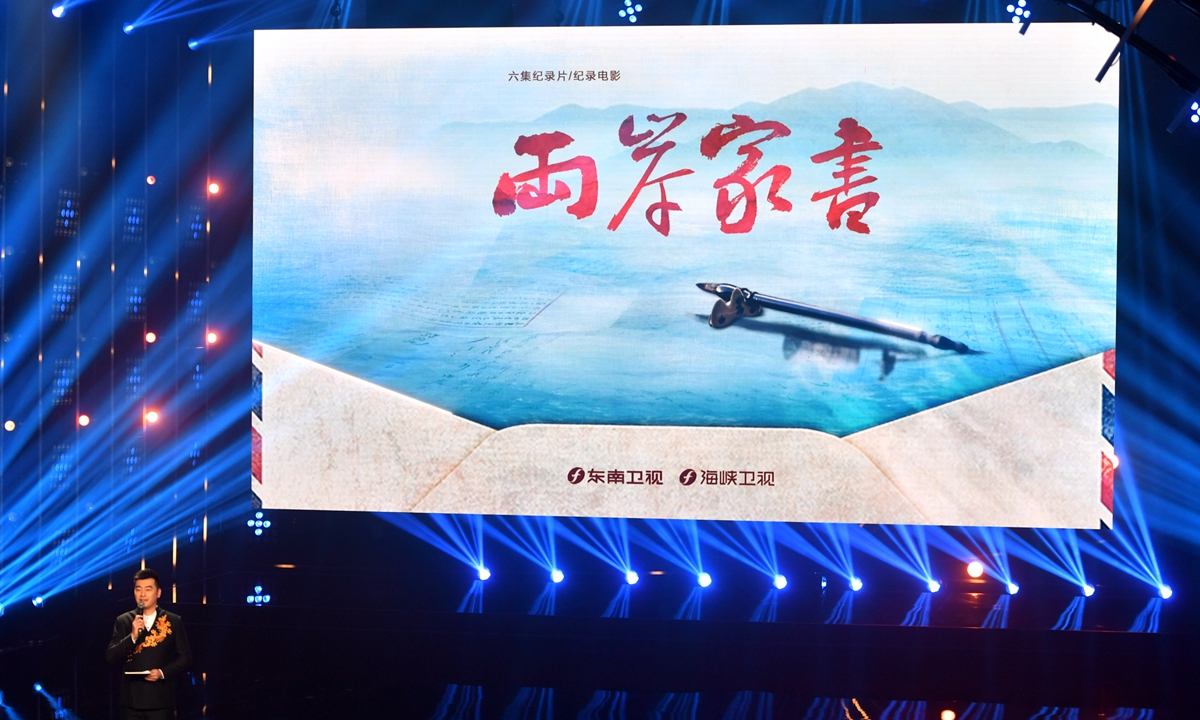
A resident on the island of Taiwan holds a banner reading "No War" to protest against the "Taiwan-US Defense Industry Forum" held in Taipei on May 3, 2023. Photo: VCG
Taiwan's secessionist Democratic Progressive Party (DPP) authorities, long-time proponents of the "resist reunification by force" doctrine, once again showcased their secessionist nature through the trailer for the latest TV drama series,
Zero Day.
The 17-minute preview, depicting a hypothetical conflict in the Taiwan Straits, has stirred a wave across the island. The drama, which enjoys full backing from the DPP, was granted unprecedented access to filming locations including the Taiwan regional leader's office and military vessels. Those who espouse the "Taiwan Straits - both sides are one family" ideal are depicted as villains in the narrative.
Observers warn that this is more than just a dramatization - it's a deliberate attempt to shape public opinion by promoting war fantasies. It demonstrated that the DPP ignores the Chinese mainland's consistent efforts toward peaceful reunification and is obstinately seeking to transform Taiwan into a battlefield and use local residents as human shields.
Zhang Wensheng, deputy dean of the Graduate Institute for Taiwan Studies at Xiamen University, pointed out that the show is a calculated move to grab attention and push a "cognitive warfare" agenda.
How far will these propagandist efforts go? What are the motives of the filmmakers and their backers? And will the Taiwan people fall prey to these manipulations?
Outrageous fantasiesThe
Zero Day trailer provides a glimpse into the storyline of this highly politically charged TV drama that caters to the demands of the DPP. The series depicts a fictional scenario in which the Chinese mainland imposes a naval blockade on the island of Taiwan following a fabricated incident involving a People's Liberation Army (PLA) Y-8 anti-submarine aircraft. The plot focuses on how Taiwan would respond to such an attack, exploring internal political divisions, potential international intervention, especially by the US and Japan, and public preparedness for war.
While the DPP has hailed the drama as a necessary exploration of potential threats, critics argue that it relies heavily on fear-mongering tactics and lacks any credible military or geopolitical analysis.
One particularly concerning aspect is the portrayal of "enemies within." The trailer heavily emphasizes the presence of the "enemy's fifth column," labeling anyone who advocates for peace or criticizes DPP's policies as a potential Chinese mainland collaborator. This includes individuals ranging from pro-reunification activists to online commentators and even ordinary citizens.
"Creating 'enemies within' is the most chilling aspect of this propaganda," Sheng Jiuyuan, director of the Center for Taiwan Studies at the Shanghai Jiao Tong University, told the Global Times.
"The series implies that anyone who disagrees with the DPP could be targeted as a traitor," Sheng said.
Furthermore, the drama suggests that the PLA would attack the island during the window period after the Taiwan regional leadership elections, implying that if there is a change in political parties, the Chinese mainland would exploit the political turmoil in Taiwan to launch a war.
This claim has been widely dismissed in the island.
"
Zero Day claims to confront the Taiwan Straits crisis head-on, but DPP leader Lai Ching-te is the one who truly needs to address it. He uses the "two state" rhet
oric to stir unrest and yet demands that the people face the crisis while using their taxes to brainwash them," commented Taiwan media outlet United Daily News (UDN).
The Global Times analyzed the cast list for
Zero Day, and found that the production is rife with ties to the DPP. Notably, the drama's consult manager is Lin Jin-Chang, a prominent figure who served as a key strategist during previous Taiwan regional leader Chen Shui-bian's election campaigns. The show's director Lo Ging-zim has also directed campaign commercials for DPP leaders Tsai Ing-wen and Lai.
The UDN reported that the drama boasts a budget of NT$230 million (US$7.6 million), primarily funded by Robert Tsao Hsing-cheng, a businessman known for his "pro-Taiwan independence" stance. The UDN also revealed that the DPP contributed an additional NT$110 million in subsidies.
Taiwan's China Times editorialized that the DPP has orchestrated a calculated campaign centered around an "anti-China" narrative: The DPP first instills fear by claiming the CPC is right at their doorstep, then justifies confronting the Chinese mainland in the name of protecting its people. The editorial piece believed that such move is just like "starting a fire and then putting it out themselves."

A documentary on family letters between both sides of the Taiwan Straits was released at the opening ceremony of a cross-Straits TV series and film event in Xiamen, East China's Fujian Province, on June 17, 2023. Photo: VCG
Malicious instigationOn August 20, the promotional team of
Zero Day hosted a special screening event for media personnel on the island of Taiwan. The series is set to be released in the first half of 2025, but why did the show kick off its promotional efforts more than six months in advance?
Yu Xintian, a research fellow specializing in international and Taiwan issues at the Shanghai Institutes for International Studies, told the Global Times that the current dissatisfaction with the Lai administration's governance has led to a need for the DPP's distraction efforts.
By exaggerating tensions between the island of Taiwan and the Chinese mainland through fictional conflicts, the show aims to divert attention from their local issues, Yu said.
The promotion coincided with the 2024 Han Kuang Exercise conducted by the Taiwan military, which simulated urban warfare and involved a significant deployment of troops and equipment in populated areas. The public backlash against the military's request for assistance in stocking up ammunition at religious sites in Miaoli county highlighted the disconnect between the authorities and the people.
"Taiwan residents do not know what they are fighting for. So, the DPP and their propaganda team are vigorously emphasizing the danger of the Chinese mainland, emphasizing that only the DPP - only by resorting to war
- can they defend Taiwan," Yu said.
Yu pointed out that the show serves to perpetuate the "China threat" rhetoric, portraying Taiwan authorities as victims in need of international support.
"The DPP also hopes to demonstrate loyalty to the US and secure continued American involvement in Taiwan Straits affairs," he added.
Sheng said that this kind of propaganda distorts the current state of cross-Straits relations and inflicts severe damage to them.
The Chinese mainland consistently emphasizes that peaceful reunification and "one country, two systems" are the basic principles for resolving the Taiwan question and the best approach to realizing national reunification.
"We will work with the greatest sincerity and exert our utmost efforts to achieve peaceful reunification. But we will not renounce the use of force, and we reserve the option of taking all necessary measures. This is to guard against external interference and all separatist activities. In no way does it target our fellow Chinese in Taiwan," a white paper to expound on the position and policies of the CPC and the Chinese government to achieve national reunification in the new era states.
Currently, the inevitable stock market crashes, social disorder, and mass exodus depicted in
Zero Day are raising growing concerns among the Taiwan public about where the DPP's cross-Straits policies will lead Taiwan island.
According to the NUD, while the drama is generating intense discussion on social media platforms, there is no call for conscription among Taiwan residents.
A survey of 400 students at a university in southern Taiwan revealed that 57 percent chose "to stay home and cooperate with the PLA," the NUD reported.
"Isn't what's shown in the clip just the possible result of some people insistently pursuing 'Taiwan independence?'" one user commented on YouTube.

Hu Defu, the father of folk music on the island of Taiwan, also known as Ara Kimbo in his indigenous language, plays the piano at opening ceremony of a cross-Straits TV series and film event in Xiamen, East China's Fujian, on June 17, 2023. Photo: VCG
Common history, culture rootSetting this ridiculous extreme case aside, it should be noted that there have been an increasing number of high-quality films, television programs, and online games that have gained popularity among people on both sides of the Straits. Audiences and gamers, particularly the young ones, genuinely choose and appreciate the outstanding cultural works from across the Straits.
The Chinese mainland-produced 3A game
Black Myth: Wukong, for instance, has risen to the top of the sales charts on Steam in Taiwan, regardless of the smears by some separatist politicians on the island.
The resonance with gamers in Taiwan feel with
Black Myth: Wukong demonstrates the power of Chinese culture in connecting the minds of people across the Taiwan Straits, Xinhua quoted Su Heng, president of a Taiwan-based cross-Straits exchange association, as saying.
"'Wukong' has led Western young people to voluntarily read
Journey to the West (a Chinese classical novel that inspired the creation of the game) and appreciate the spiritual realm of Chinese people, ...how can the DPP with 'de-Sinicization' attempts teach the young generation to support them, and ignore the monkey who is making waves in the Western world?"
Compatriots on both sides of the Taiwan Straits are of the same origin and share a common history and cultural roots, Yu said.
It is normal that people on the island of Taiwan have resonated with Chinese classical literary works such as
Journey to the West, and are interested in the Chinese mainland's trending TV series, films, and video games, she said.
At a cross-Straits TV series and film event in June,
The Abandoned and
New Legend of Madame White Snake were respectively awarded the most popular Taiwan movie and TV drama title among Chinese mainland audiences, while
Lost in the Stars and Joy of Life were the most popular mainland film and TV series among Taiwan audiences, respectively.
Empresses in the Palace, an epic tale of love and betrayal in ancient China, is a Chinese mainland-produced TV drama series that won great acclaim and high audience ratings on both sides of the Straits. On the island of Taiwan, watching this drama series online during the Chinese New Year (CNY) holidays has become customary for many residents, as some people joked that the drama is a "CNY gala" for Taiwan audiences.
During this year's CNY celebrations in February, Taiwan's major TV channels jointly broadcast this drama series and received more than 7 million views between February 6 and 18, according to Singaporean media outlet Lianhe Zaobao.
"Lai's DPP has been promoting 'de-Sinicization,' especially in terms of history and the education of young people on the island of Taiwan, but I believe they can never achieve it," Yu said. "The vast majority of Taiwan residents have a cultural identity tied to the Chinese nation. The limited methods of the separatist DPP authorities are far from completely deceiving the people."
If Lai values public opinion as he claims, he should take note of that," Zhang told the Global Times. "The trend of cross-Straits reunification, and the process of the rejuvenation of the Chinese nation, will never be stopped by the small tricks of a few separatists."






